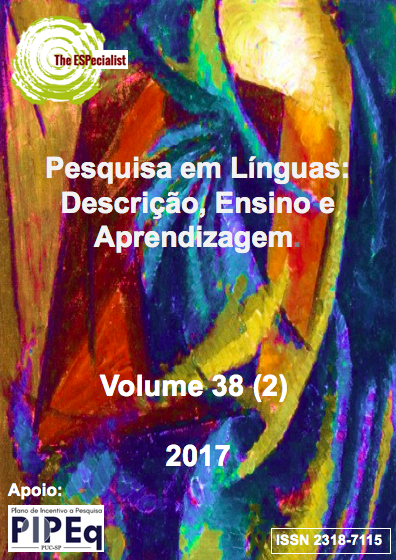O DIÁLOGO ENTRE O PÓS-MÉTODO E A COMPLEXIDADE: CRIANDO OPORTUNIDADES DE APRENDIZAGEM NA SALA DE AULA
DOI :
https://doi.org/10.23925/2318-7115.2017v38i2a2Mots-clés :
Oportunidades de aprendizagem, Condição pós-método, Complexidade, Parâmetros pedagógicos da condição pós-método, Metodologia de projetosRésumé
Neste artigo teórico resenhamos e discutimos a respeito da mudança paradigmática na educação (MORIN, 1990/2008; BEHRENS & OLIARI, 2007; MORAES, 2006) e, a partir dela, repensamos o ensino-aprendizagem e a prática docente. Para tal, estabelecemos um diálogo entre a condição pós-método (Kumaravadivelu, 2006) e a perspectiva da complexidade (Morin, 1990/2008, 1999/2006a, 1999/2006b, 2005/2006, 2008/2010), examinando a inter-relação entre os parâmetros pedagógicos da condição pós-método, as oportunidades de aprendizagem (CRABBE, 2003 e ALLWRIGHT, 2005) e a metodologia de projetos (BEHRENS, 2006).
Références
ALLWRIGHT, D. 2005. From teaching points to learning opportunities and beyond. TESOL Quarterly, 39.1: 9-31. Alexandria.
ASSMANN, H. 1998. Metáforas para reencontrar a educação Piracicaba: Unimep.
BEHRENS, M. A. 2006. Paradigma da Complexidade. Metodologia de projetos, contratos didáticos e portfólios. Petrópolis: Editora Vozes.
BEHRENS, M. A.; OLIARI, A. L. T. 2007. A evolução dos paradigmas na educação: do pensamento científico tradicional a complexidade. Diálogo Educacional, 7: 53-66, Curitiba.
CRABBE, D. 2003. The quality of language learning opportunities. TESOL Quarterly, 37.1: 9-34, Alexandria.
D’AMBRÓSIO, U. 2003. Novos paradigmas de atuação e formação de docente. In: T. M. E. PORTO (Org.), 2003, Redes em construção: meios de comunicação e práticas educativas. São Paulo: JM Editora. 1a. ed., pp. 55- 77.
D’ESPOSITO, M. E. W. 2012. Prática Escrita em língua inglesa: um curso online para professores da rede pública estadual, sob a perspectiva da complexidade. Tese de Doutorado, Pontifícia Universidade Católica de São Paulo.
KUMARAVADIVELU, B. 2006. Understanding Language Teaching – from Method to Postmethod. New York: Lawrence Erlbaum Associates.
MARIOTTI, H. 2007. Pensamento complexo: suas implicações à liderança, a aprendizagem e ao desenvolvimento sustentável. São Paulo: Atlas.
MORAES, M. C. 2006. O paradigma Educacional Emergente. Campinas: Papirus.
MORAES, M. C. 2008. Ecologia dos Saberes: Complexidade, transdisciplinaridade e educação. Novos fundamentos para iluminar novas práticas educacionais. São Paulo: Antakarana/WHH- Willis Harman House.
MORIN, E. 1990/2008. Ciência com consciência. Rio de Janeiro: Bertrand Brasil.
MORIN, E. 1999/2006a. A cabeça bem-feita: repensar a reforma, reformar o pensamento. Rio de Janeiro: Bertrand Brasil.
MORIN, E. 1999/2006b. Os sete saberes necessários à educação do futuro. São Paulo: Cortez Editora.
MORIN, E. 2005/2006. Introdução ao Pensamento Complexo. Porto Alegre: Editora Sulina.
MORIN, E. 2008/2010. Meu caminho. Entrevistas com Djéanne Kareh Tager. Rio de Janeiro: Bertrand Brasil.
TESCAROLO, R. 2004. A escola como sistema complexo: a ação, o poder e o sagrado. São Paulo: Escrituras Editora.
WALLACE, M. J. 1991. Training foreign language teachers: a reflective approach. Cambridge: Cambridge University Press.
Téléchargements
Publiée
Comment citer
Numéro
Rubrique
Licence
The authors grant the journal all copyrights relating to the published works. The concepts issued in signed articles are the absolute and exclusive responsibility of their authors.


 Esta obra está licenciada com uma Licença
Esta obra está licenciada com uma Licença 